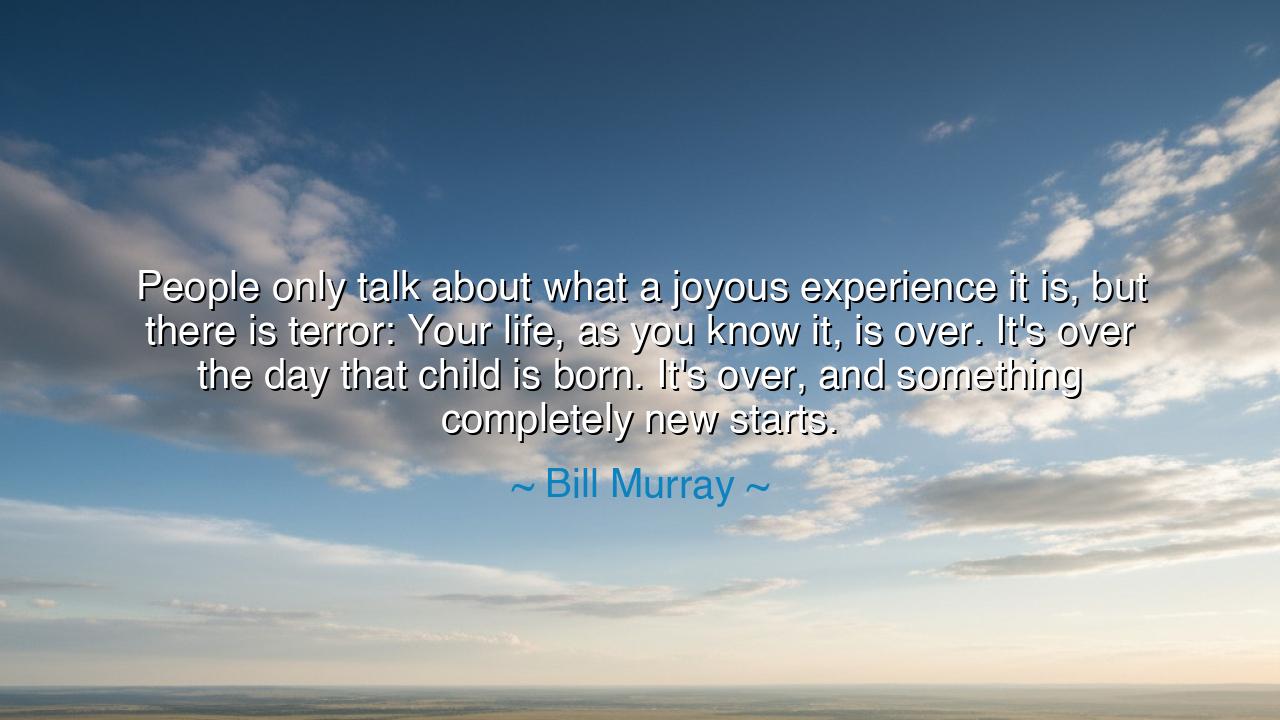
People only talk about what a joyous experience it is, but there
People only talk about what a joyous experience it is, but there is terror: Your life, as you know it, is over. It's over the day that child is born. It's over, and something completely new starts.






"People only talk about what a joyous experience it is, but there is terror: Your life, as you know it, is over. It's over the day that child is born. It's over, and something completely new starts." — thus spoke Bill Murray, the jester-philosopher of our age, whose laughter has long masked a mind that sees deeply into the truth of human existence. In these words, he unveils not cynicism, but revelation — that every birth is both an ending and a beginning, that joy and terror are twins, forever bound in the mystery of transformation. His voice, though wrapped in humor, speaks like that of an ancient sage who knows the cost of love: that to truly give life, one must surrender the life one knew.
In this saying, Murray does not speak of parenthood as a simple blessing; he speaks of it as a rebirth through loss. The coming of a child is a moment of rapture — a miracle that floods the soul with love so vast it cannot be contained. But beneath that light lies the shadow of surrender. The parent who once lived freely, ruled by self and choice, must now die a small death — for their world is no longer their own. The life they had built — its rhythms, its priorities, its sense of self — ends with the first cry of the newborn. Yet from that ending arises something greater: the sacred calling of responsibility, of selflessness, of love that no longer serves the self but another.
Murray’s wisdom is not bitter; it is honest. The world loves to speak of the sweetness of parenthood — the tiny hands, the laughter, the purity of new life — but seldom of the fear that walks beside it. For when a child enters the world, so too enters the awareness of fragility. The parent becomes guardian of another soul, bound by a love so powerful it is terrifying. To love a child is to live with one’s heart outside one’s body, forever exposed to the winds of fate. This is the terror Murray speaks of — not despair, but the trembling awe of realizing that love can destroy the boundaries of the self.
The origin of this truth can be traced not merely to Murray’s own experience as a father, but to the timeless understanding of transformation that echoes through all human wisdom. For in every great change — in art, in faith, in love — something must first die for something new to live. The Greeks knew this when they told of Demeter and Persephone, the mother who lost her daughter to the underworld and, through that loss, gave birth to the seasons. The old self withers, the new self blossoms — and life, in its endless rhythm, is renewed. So too with parenthood: the life one knew fades, replaced by one deeper, rawer, more complete.
Consider, too, the story of Mary Shelley, the creator of Frankenstein. She knew the sacred terror of creation — not of motherhood alone, but of birthing something that would forever change her. Her novel was not merely about a monster, but about the act of creation itself — the awe, the fear, the responsibility that follows bringing forth life. In her grief for the children she lost, she understood what Murray meant centuries later: that to give life is to surrender control, to be remade by love and loss alike. The creator — whether of art or of children — is never the same once their creation takes its first breath.
Yet in this death of the old self, there is no tragedy. It is transcendence. Murray’s reflection teaches that the greatest joys in life come not from possession, but from transformation. To become a parent — or a mentor, or a creator, or a lover — is to step beyond the limits of selfhood and into the vastness of connection. It is to realize that the life we cling to is too small for the love we are meant to hold. When we let the old life die, we make room for something divine — a love that teaches patience, humility, and sacrifice.
So let this be the teaching: Do not fear the ending of your old life, for every ending is a preparation for rebirth. When you stand on the threshold of change — whether it be parenthood, loss, or love — let go of the self you once were. Mourn it if you must, for mourning is holy. But then, open your arms to what comes after. The terror you feel is not a warning; it is the trembling of the soul as it expands to fit a greater love.
And remember, O seekers of wisdom, the truth within Bill Murray’s words: that joy without fear is shallow, and creation without surrender is hollow. The day a child is born, the world is remade — not only for the child, but for the parent, for humanity itself. Life as you knew it may be over, but something far greater has begun: the chance to live not for yourself, but for love. And in that surrender lies not loss, but the highest form of freedom — the freedom to be reborn through giving, and to find eternity in the fragile hands of another.






AAdministratorAdministrator
Welcome, honored guests. Please leave a comment, we will respond soon